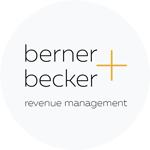Budgeting in Hotels: Theory, Practice and Outlook 2025!
Budgeting in hotels is one of the core tasks of revenue management and plays a crucial role in managing operational and financial efficiency. The budget serves as the basis for financial planning, control, and decision-making. It is not just about setting numbers but involves a systematic approach that requires both theoretical foundations and practical application.
Theoretical Foundations of Hotel Budgeting
A budget primarily serves to plan and control a company’s finances. In hotels, the budget is particularly important as it functions as a management tool for various departments, such as housekeeping, the front office, or the restaurant. It is designed to optimally allocate available resources while ensuring the achievement of the company’s goals. A central aspect of budgeting in the hospitality industry is the consideration of external factors that influence demand and pricing. These factors include macroeconomic developments such as economic growth and inflation, which are supported by analyses like those from the Ifo Institute.
Practical Elements of Hotel Budgeting
The practical implementation of budgeting in hotels requires precise planning and analysis. Throughout the year, various phases of the budgeting process are followed, based on clearly defined steps:
Preparation: The foundation of budget planning is based on historical data and market research forecasts. Past business results are analyzed to create a realistic basis for the upcoming months. External influences, such as seasonal fluctuations or macroeconomic developments, are also taken into account.
Estimation and Forecasting: Accurate forecasting of occupancy rates, average daily rate (ADR), and other revenue metrics plays a key role in budgeting. This involves demand forecasts as well as price adjustments due to inflation and competitive pressure. For example, general economic trends, such as projected economic growth and expected inflation, can influence the budget. The German economy is slowly recovering from the crisis, with GDP growth of 0.4% in 2024 and 1.5% in 2025, according to the Ifo Institute. Inflation is expected to decline from 5.9% in 2023 to 2.2% in 2024 and 1.7% in 2025, also according to the Ifo Institute.
Cost Management: In addition to revenues, the costs of various hotel areas, such as personnel, operating resources, and marketing, must be planned. Efficient management of operating costs is crucial to maximize profit margins.
Implementation: Once the budget has been created and approved, the implementation phase begins. It is regularly reviewed to ensure that goals are being met, and adjustments are made if deviations occur. Revenue management and forecasting are essential in this phase.
The Importance of a Budget in the Hospitality Industry
A budget in hotels is more than just a financial plan. It ensures that all departments are working toward the same goals and allows hotel managers to operate in line with company strategies. Especially in times of economic uncertainty or rising operating costs, the budget is an indispensable tool to ensure profitability. It also allows for monitoring and controlling deviations between planned and actual results. This supports a quick response to market changes and helps to identify opportunities early, such as adjustments in pricing models or service offerings.
Hot Tips and Outlook for 2025
Data-Driven Decisions: Modern budgeting processes in hotels increasingly rely on data-driven decisions. The use of revenue management systems for real-time analysis and optimization of pricing strategies is becoming more important to fully exploit market potential.
Flexibility in Planning: Another important tip for budgeting in 2025 is maintaining flexibility. Given the continued global uncertainties, such as geopolitical tensions or climatic impacts on tourism, hoteliers should regularly review and adjust their budgets if necessary.
Sustainability Focus: With growing environmental awareness, it is important to include sustainable investments in budget planning. Hotels that invest in eco-friendly technologies or sustainable offerings can gain a competitive advantage and attract new target groups.
Personnel Costs and Digitalization: A growing labor shortage in the hospitality industry will continue to increase personnel costs. However, investments in digital processes to automate operations could help reduce costs in the long run while improving service quality.
Outlook for 2025: According to current forecasts, the German economy could continue to recover slightly by 2025. This offers a positive outlook for the hospitality industry. However, it will be crucial to respond early to changes in demand and customer needs. International tourism remains strong, which could be a significant advantage for German hotels with international guests. Additionally, 73% of Germans plan to continue traveling, despite economic uncertainty.
Conclusion
Budgeting in hotels is a dynamic and strategic process that combines both theory and practice. For 2025, it will be crucial to plan flexibly to be optimally prepared for future challenges. The economic outlook is positive, but rising costs and changing guest expectations require continuous adjustment and optimization of budget processes.




